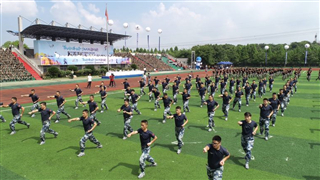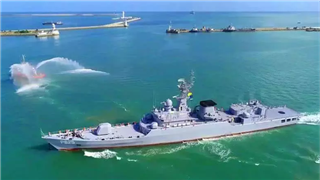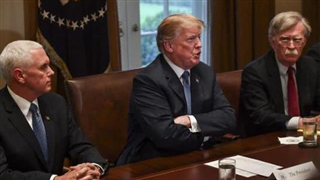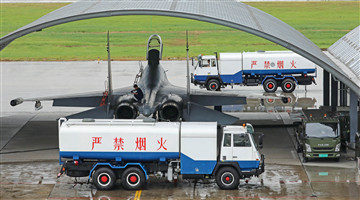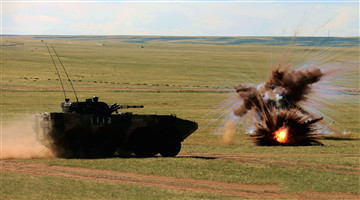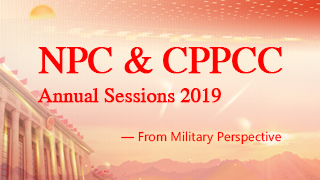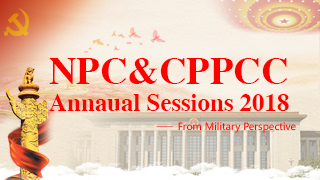By Wang Haili
On the afternoon of June 30, US President Donald Trump shook hands with the DPRK leader, Kim Jong-un, in Panmunjom village at the Demilitarized Zone, also known as the DMZ, and was invited to cross the demarcation line, becoming the first sitting US president to set foot in the DPRK territory. Kim and Trump agreed to resume and push forward productive dialogues for making a new breakthrough in the denuclearization of the Korean Peninsula. This was hailed by the international community, as it helps to reignite the hope of advancing the long stalemate denuclearization talks. It is well wished that the small step of Trump could lead to a giant leap towards the solving of Korean Peninsula issue.
It’s a “flash meeting” that complies with both sides’ urgent demands.
Compared with the tedious communication and coordination between the two sides’ diplomatic departments prior to previous two summits, the meeting in Panmunjom was a quickly-prepared flash meeting. The fundamental impetus behind it is the common interests needed by both sides. Trump announced his reelection campaign for the 2020 presidential election on June 18 and the Korean Peninsula diplomatic “achievements” would be the possible best chance of ‘win’ for him. Therefore, there is no doubt that he is bound to use this card well. As for DPRK side, after achieving the goal of nuclear and missile capability in 2017, it has put forward a new strategy of “socialist economic construction”. But international sanctions act as a “straitjacket” on the new strategy. Therefore, getting rid of this straitjacket has become a priority. Thus, Trump, for votes and security, and Kim, for security and development, they jointly pushed the meeting at the DMZ.
The meeting creates new motivation into the prolonged stalemate.
After the meeting, Trump said the US would set up a working team to consult with the DPRK in the next two to three weeks. The second “Trump-Kim summit” tested each other’s “bottom line” but ended fruitless. The main reason is that the DPRK and the US have fundamental differences on the connotation and path of denuclearization, with lack of mutual trust. The third meeting is a re-engagement, which shows that the two sides are still willing to stick to the path of the political settlement of the peninsula issue. In particular, Trump said that he “hopes to ease the economic sanctions against the DPRK at any time, but will maintain the sanctions at the present stage”, and “is in no hurry, but focus on the effect rather than the speed”, all of which indicated that he is realizing that it is impossible to denuclearize the Korean Peninsula overnight, and pursuing maximum interests through “extreme pressure” on the DPRK does not seem to be effective. Meanwhile, Trump may also want to utilize this “diplomatic asset” to benefit his second term, as well as to build his own legacy in history. It does not matter what Trump thinks, adjusting the stance of the US on the peninsula issue shows that the meeting will have a more constructive and strategic impact on enhancing the strategic mutual trust between the DPRK and the US and promoting the political settlement of the Korean peninsula issue.
The political settlement of peninsula issue remains twists and turns.
After the third Trump-Kim summit, both leaders expressed their satisfaction over the outcome of the meeting, and pledged that they would resume and actively promote constructive dialogue. However, given the 70-year hostility between two countries, particularly the latest twists of the peninsula issue since 2018, one should not be over-optimistic about whether Trump’s one small step could lead to a giant leap for solving the peninsula issue. The key factors restricting the US-DPRK dialogue have not been removed. First, the ice of hostility between the two countries accumulated for nearly 70 years will not be melted simply by an “interesting meeting”. Second, the strongman personality of both leaders brings great uncertainty for the solution of the problems and casts a shadow over the future settlement of the peninsula issue. Third, Trump’s attempt to resolve the Korean peninsula issue is to garner more votes, while the Democrats are bound to create obstacles over his reelection campaign and other interests. Therefore, the political settlement of the peninsula issue looks like a long process full of challenges in the future. However, two points are certain: one is that the peninsula will never go back to the past, no matter what the future holds and how the issue will be solved either over a talk or goes to war; second, dialogue is always better than confrontation. As long as the talks continue, there is a prospect of political settlement of the peninsula issue.
(The author Wang Haili is a senior researcher fellow with the Center for Policy Studies of the Grandview Institution.)
Disclaimer: This article is translated from Chinese into English and edited by the China Military Online. The information, ideas or opinions appearing in this article do not reflect the views of eng.chinamil.com.cn.

